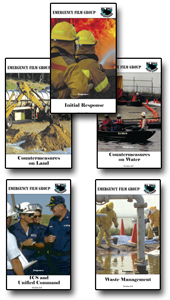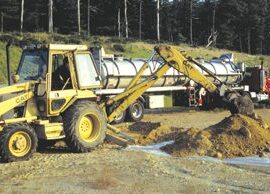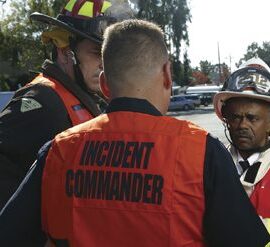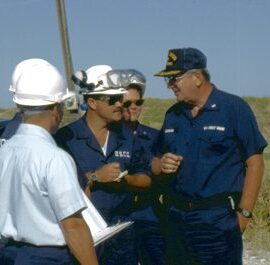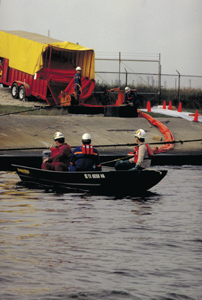Oil Spill Response Series DVD
$1,304.25
Major oil spills such as that occurring in the Gulf of Mexico have the potential to damage our way of life.
Immediate response by trained personnel is necessary to minimize the damage to the environment.
Oil Spill Response is a 5-part training series that provides important health and safety information for clean-up workers. Created with the assistance of the US Coast Guard, this series examines all recognized clean-up technologies and emphasizes waste management techniques.
It is used worldwide by the US Coast Guard and some 500 other organizations. It is ideal as a crash course ot meet OSHA and USCG regulations.
Series includes five programs with two hours of video plus Leader’s Guide that outlines a course of instruction. Available as five DVDs.
About Initial Response
* Activities to take before the spill arrives
* How spills commonly occur
* Factors to consider during the response
* Different types of oils, including gasoline, jet fuel, naphtha, gasoline, diesel fuels, asphalt, and crude oil
* Hazards associated with oil during the different phases of the spill, including fire risk, toxicity, mechanical dangers, and environmental threats.
* Agencies to be notified of a spill
* Factors that affect spill behavior
* Site control
* Responder safety
* Incident management. 28 minutes
About Countermeasures on Land
* The ecological impact of oil spills on land and along the shoreline
* Contingency plans
* Control activities and spill countermeasures: low and high pressure washing, sand blasting, soil washing, physical removal, mechanical removal, vacuum pumping, use of sorbents, degradation and bioremediation.
* Potential impact of treatment methods
* Safety precautions
* How land spills behave
* Preparing for an approaching spill
* How intrusive clean-up methods can delay natural recovery
* The special problems of shoreline clean-up. 28 minutes
About Countermeasures on Water
* The factors that challenge responders to water spills, including weather, wind, sea conditions, and currents.
* How oil weathers when spilled on water
* Resources for enlisting aid
* Tracking spills to predict ecological impact
* Managing the response effort
* Countermeasures, including booms and barriers, skimming, herding, absorbents, in situ burning, chemical treatment (dispersants and gelling agents), and bioremediation
* Safety precautions
* Dealing with contaminated wildlife. 28 minutes
About Waste Management
* Handling recovered oil and other hazardous wastes resulting form the clean-up effort
* Waste management priorities: eliminating the waste, reducing the amount of waste, recycling the waste, treating the waste, and disposing of the waste
* Standards waste oil must meet for recycling
* Temporary storage options for bulk oil
* Oil/water separation
* Vacuum trucks.
* Extracting emulsions
* Disposal and reclamation. 22 minutes
About ICS & Unified Command
* Explains how a single organizational structure is formed through the mutual agreement of cooperative agencies
* Who the key players in the response will be and the responsibilities of each
* How resources are integrated successfully. 28 minutes.
You might also be interested in:
Categories
- Firehall Mall
- First Alert Smoke & Carbon Monoxide Alarms
- Coming Soon – Pre-Order
- ATS Online Training
- NFPA Standards & Fire Codes
- Ontario Codes
- Fire Safety & Public Education Materials
- Fire Service & Rescue
- Fire Investigator
- Fire Inspection & Code Enforcement
- Apparatus Driver/Operator
- Fire Protection/Systems & Apparatus
- Vehicle Extrication/Highway Safety
- Hazardous Materials
- Industrial / Facility
- Building & Life Safety
- Fitness / Wellness / Health & Safety
- Wildland
- Management / Leadership / Advancement
- Firefighter Entry Level
- Emergency Medical Service
- Emergency Management/Terrorism
- Firefighting Novels/History/Memoirs
- Deals & Steals

